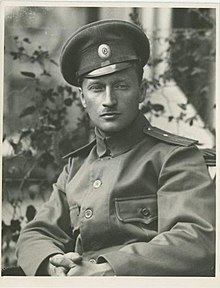
Aleksandr Danilovich Grinberg (Russian: Александр Данилович Гринберг; 1885–1979) was a photographer. In 1908 he was awarded the silver medal in the all-Russian photo exhibition in Moscow and the gold medal in the international photo-exhibition in Dresden.
Since 1929, the year of the "Great Break", with the turn in the Soviet politics toward arts, his erotic photography was declared inappropriate for Soviet morale, as a feature of the "overindulged idleness of the rich". His works came under increasing criticism in the context of government views of socialist morality. Nevertheless, he risked exhibitions of semi-naked women, and was eventually sentenced to Gulag labor camps (1936–1939) "for distribution of pornography".
Filmography
- 1921 — Story of Seven Who Were Hanged
- 1926 — A Descendant of an Arab
- 1927 — Three Friends and an Invention
References
- "Гринберг Александр – Современные фотохудожники – Изобразительное искусство". art.rin.ru. Retrieved 2020-10-19.
- ^ "Alexander D. Grinberg (1885-1979)". 2007-03-06. Archived from the original on 2007-03-06. Retrieved 2020-10-19.
- "Alexander Grinberg's gallery". Archived from the original on 2014-07-26. Retrieved 2014-07-23.
- "Александр (Абрам) Гринберг". Кино-Театр.РУ. 16 March 2019. Retrieved 2020-10-19.
- Gao, Yunxiang (2021). Arise, Africa! Roar, China! Black and Chinese Citizens of the World in the Twentieth Century. Chapel Hill, NC: University of North Carolina Press. p. 186. ISBN 9781469664606.
External links
- "Alexander Danilovich Grinberg (1885-1979)". La Petite Mélancolie (in French). 2020-02-01. Archived from the original on 2021-02-27.
photography
This article about a European photographer is a stub. You can help Misplaced Pages by expanding it. |